1998 Student Kidnapping is Human Rights Violation
Prabowo Subianto is hoping to erase his sins in relation to the 1998 kidnappings. Gross human rights violations will not be a priority.
maaf email atau password anda salah

Prabowo Subianto is hoping to erase his sins in relation to the 1998 kidnappings. Gross human rights violations will not be a priority.

The obligation to obtain halal certification leads to higher economic costs and corruption. Labeling products that are non-halal would be more efficient.

Jokowi’s son-in-law, Bobby Nasution is caught up in alleged bribery involving a mining permit in North Maluku. He is accused of selling his influence.
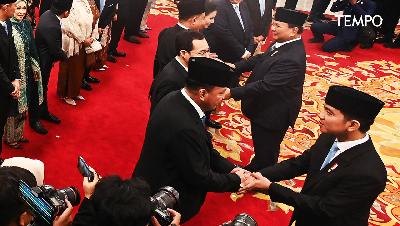
A number of problematic individuals are appointed to Prabowo Subianto’s cabinet. It will be difficult for the government to be effective in its first one or two years.
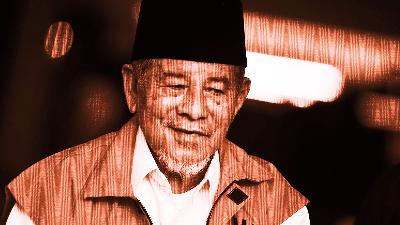
The term “Medan Block” emerged during the trial of former North Maluku Governor, Abdul Gani Kasuba. Medan Block is believed to refer to pre-allocated nickel mining concessions in Halmahera.
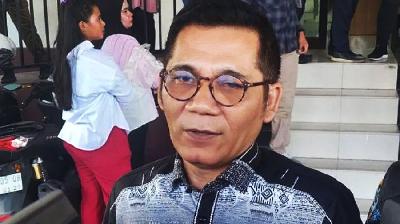
Former North Maluku Governor Abdul Gani Kasuba acknowledged meeting with Bobby Nasution but claimed he gained no advantage from it.
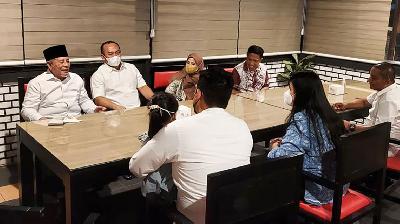
Bobby Nasution is suspected of managing the Medan Block nickel mine since 2021. He met with Abdul Gani Kasuba before becoming the Mayor of Medan.
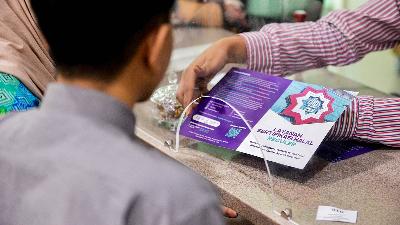
Entrepreneurs complain about the costly and complicated halal certification process. They must pay monthly fees for supervision.

Halal certification is slow due to inadequate supporting infrastructure. It has the potential to trigger a high-cost economy.

Entrepreneurs are pressured by the mandatory halal certification regulations. The costs associated with obtaining halal labels are considered expensive, and the procedures are complicated.
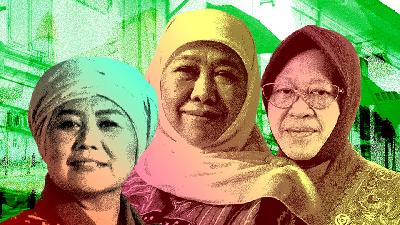
Three East Java gubernatorial candidates—Luluk, Khofifah, and Risma—talk about the competition in the 2024 regional head elections.
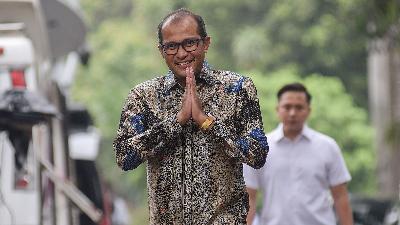
Prabowo Subianto appointed ministers and deputy ministers with problematic backgrounds in his cabinet. Several of them are closely associated with businessman Haji Isam.
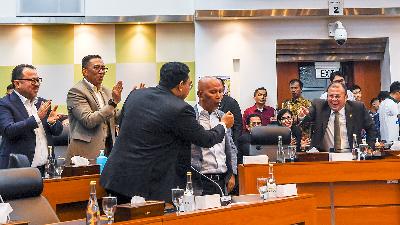
The PDI-P received the most positions as leaders of the DPR working bodies. Surya Paloh met with Bahlil Lahadalia to discuss the allocation of commission chairs.

The new ministries and agencies established by Prabowo Subianto cannot operate immediately. Some lack office space, have tight budgets, and are short on staff. The authority of the Haj and Umrah Organizing Agency even violates the law.

The rupiah is weakening amid the power transition, with global factors also exerting heavy pressure.

The new government under Prabowo Subianto is already formed. Can we hope for what the future holds?

Driven by corporate demand, helicopter business opportunities continue to grow. Operators are increasingly expanding their fleets.

The phrase “human rights” was lost from Prabowo Subianto’s inauguration speech.

Food, like language, clothing, and customs, is a marker of our roots. Especially in the past.
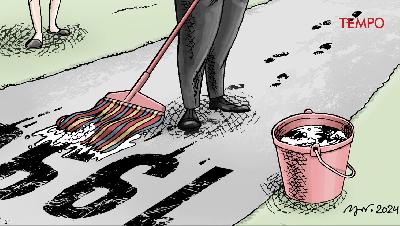
Cartoon: Yuyun Nurrachman
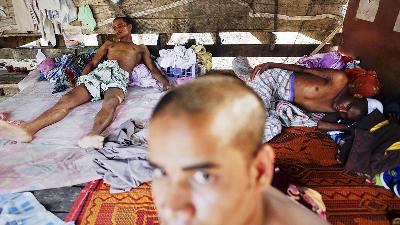
Rohingya refugees in Thailand, Malaysia, and the Philippines are treated differently than those in Indonesia.
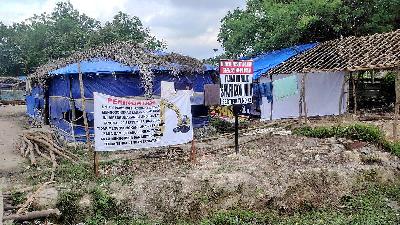
The Rohingya refugees living in Pekanbaru have more freedom to move around and reside in lodgings. Their children can also attend school.

The increasingly overcrowded refugee camps demand improvements in the mechanisms for handling Rohingya refugees. The number of refugees continues to rise.

Several Rohingya refugees successfully built their careers in various fields. They continued to work and raised awareness about the plight of displaced Rohingya refugees.
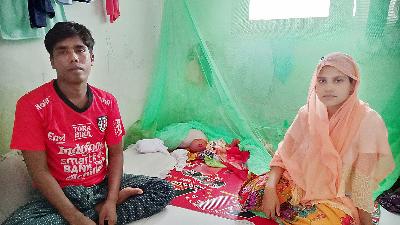
Rohingya refugees are still living in several inadequate temporary shelters in Aceh.

There are indications of problems with the IPO of Barito Renewables Energy. The stock exchange and capital markets authorities are neglecting their responsibilities.

There is an increasingly real threat to Indonesia’s biodiversity. It cannot be overcome through empty slogans at international forums.

The KPK should designate Sahbirin Noor a fugitive. There is a good chance the South Kalimantan Governor will go free.
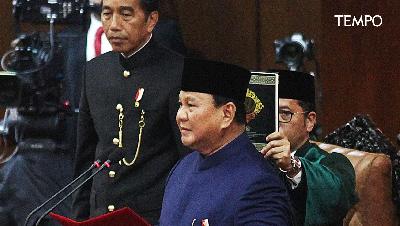
How did Prabowo Subianto decide on the composition of his cabinet? There are indications that several prospective ministers were proposed by tycoons.

Prabowo Subianto is inheriting an inefficient economy. Yet his new administration is likely to follow Jokowi’s economic model.
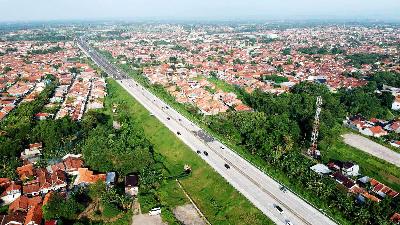
The Joko Widodo administration leaves a heavy burden for state-owned enterprises. Many projects result in big debts.
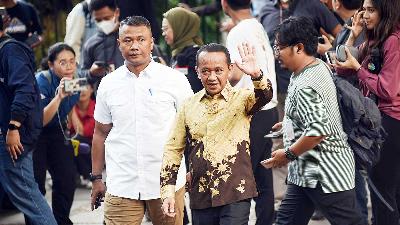
President Jokowi entrusted his confidants to join Prabowo’s cabinet. Several ‘volunteers’ also received positions.

Prabowo Subianto formed a large cabinet to accommodate the interests of parties, businessmen, and his supporters. Mining entrepreneur Haji Isam is suspected of proposing several ministerial candidates.
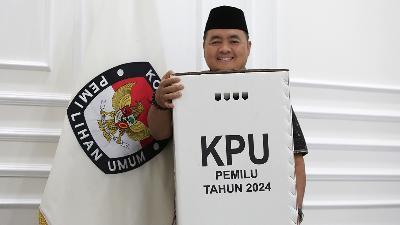
KPU Chair Mochammad Afifuddin on turbulence within his institution following the dismissal of Hasyim Asy’ari, and the Constitutional Court’s decision on the regional head elections.
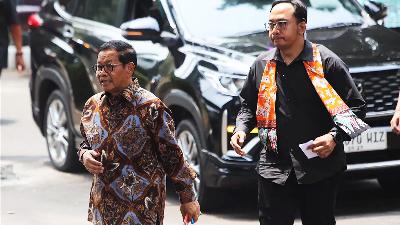
Megawati reportedly did not approve of PDI-P cadres entering Prabowo’s cabinet. She chose Pramono Anung to communicate with Prabowo.
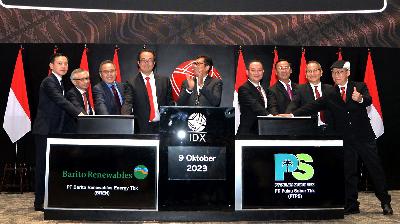
The Stock Exchange detects alleged violations in the IPO of Barito Renewables Energy. There are indications of maneuvering around public shareholding requirements.
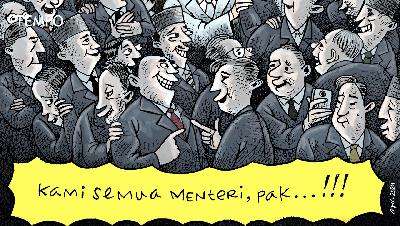
Cartoon: Yuyun Nurrachman
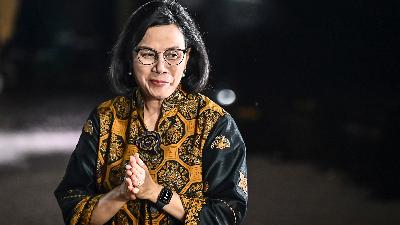
Sri Mulyani and several economic ministers from Jokowi join Prabowo’s cabinet, with encouragement from two former presidents.
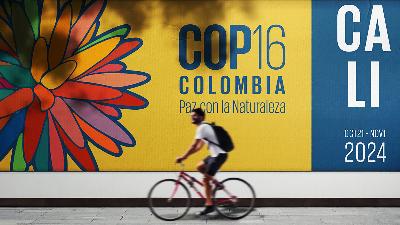
Indonesia’s delegation at COP16 CBD in Cali, Colombia, is not led by a minister. Biodiversity funding is at risk of not being agreed upon.

South Kalimantan Governor Sahbirin Noor is suspected of receiving commissions on three projects in the e-catalog. He has not been seen since being named a suspect.
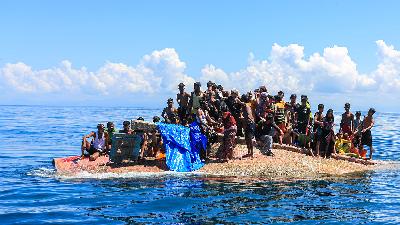
Uncertain future looms over Rohingya refugees in Indonesia. They are also struggling with various limitations.

Empathy is the key to happiness. We are happy when we help others, we are happy when we do good.

OJK’s right of reply and a remembrance to Mochtar Lubis who wrote about government.

The KPK uncovered alleged embezzlement of the Taspen pension fund involving Sinarmas Sekuritas. The result of poor supervision by the OJK.

A number of policies from Minister Sakti Wahyu Trenggono are riddled with conflicts of interest. They benefit his son, Indra Trenggono.

There are indications that the selection of the KPK leadership for the 2024 to 2029 period is in breach of a Constitutional Court ruling. The process needs to be rerun.
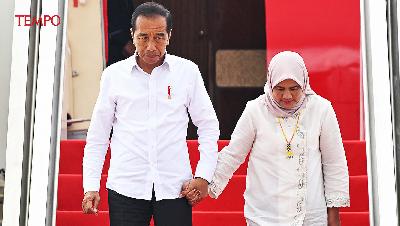
Jokowi is like a king reluctant to relinquish his crown. Nearing retirement, he is still trying to improve his image.

A reader’s letter suggests authorities seek ways for safe and efficient logistics transportation, in order to minimize traffic accidents.

Farwiza Farhan, the winner of the 2024 Ramon Magsaysay award talks about conservation of the Leuser Ecosystem in Aceh.
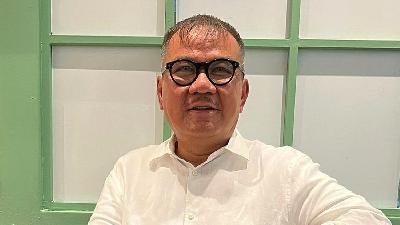
The KPK Leadership and Supervisory Board Selection Committee claimed to have followed procedures, and Jokowi reportedly did not intervene.
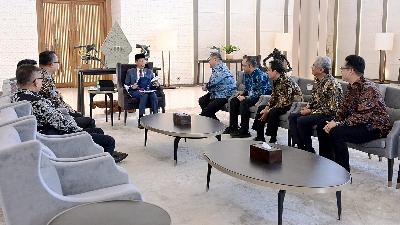
Various parties from the National Police Chief to the State Palace are accused of interfering in the KPK leadership candidates selection process. The candidates are divided into four clusters.

The KPK is investigating Taspen’s investment losses. Sinarmas is behind the transaction.

The family members of some ministers enter the fishery business. Other problems, such as the activity of illegal foreign vessels and the abuse of crew members, still prevail.

Explanations from State Secretary Minister Pratikno and Maritime Affairs and Fisheries Ministry on fishery business and the case of illegal ships in eastern Indonesia.
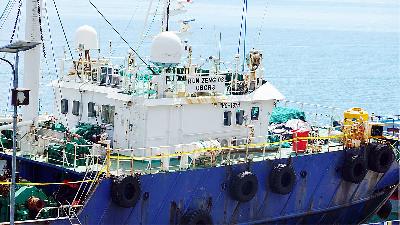
Illegal fishing and slavery continue to occur in Indonesian waters. Crew members are vulnerable to abuse.
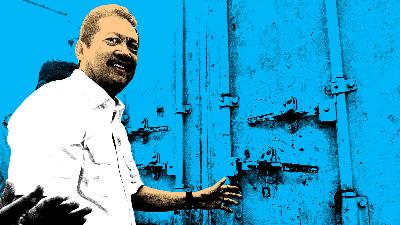
Minister Sakti Wahyu Trenggono revives a shutdown port. There is indication that the minister’s son is involved in the fisheries business.
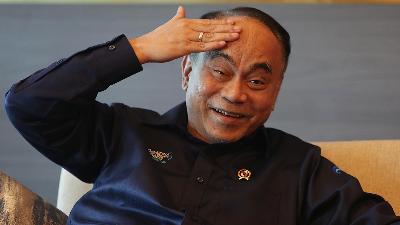
Tempo’s interview with Minister of Communication and Informatics Budi Arie Setiadi about Jokowi’s campaign before the end of his tenure.
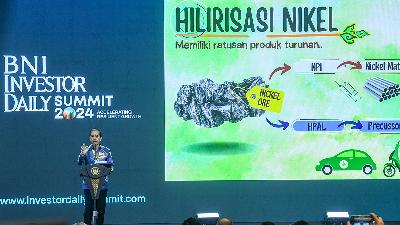
Jokowi’s campaign promoting his successes is considered as not portraying actual conditions. Customary communities are among the victims of his administration.
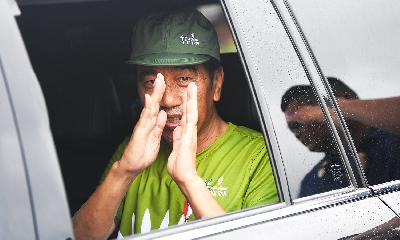
After stepping down, Jokowi will return to Solo, accompanied by his loyal supporters. He is not having a lavish farewell in order to avoid any negative sentiment.

As President Jokowi's term neared its end, instructions were given to promote the government's achievements, and billions of rupiah in contracts were offered to the media.

The market showed no positive reaction ahead of Prabowo Subianto's government, which was held back by the high amount of debt.

Life is not always about science and philosophy. This is where literature shows its value.

Cartoon: Yuyun Nurrachman

Jakarta's regulations were considered as failing to fulfill the aspirations of differently-abled people
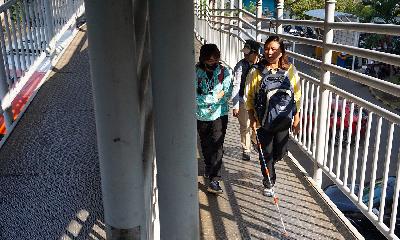
Tempo accompanied several differently-abled people as they navigated public transportation in Jakarta.
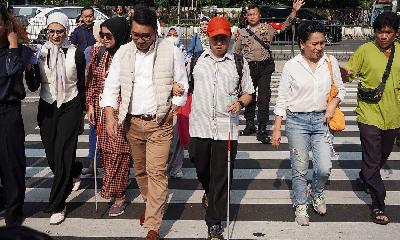
Jakarta governor and deputy governor candidates promise improvements in inclusive public transportation.

Jakarta is striving to provide inclusive transportation, but challenges remain, from funding issues to construction oversight.
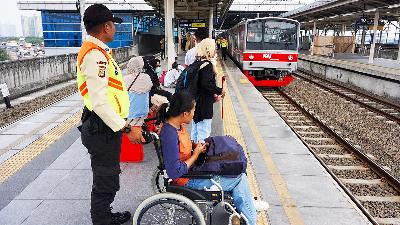
Despite some improvements, much still needs to be done regarding access to public transport for people with disabilities.

Officials are all trying to avoid responsibility for illegal gold mining in protected forests. The dangers to the environment and to health are being ignored.

Instead of paying its debts, the Bakrie Group is suing 12 creditors. This could become a bad precedent for the investment climate.

The contest for the selection of the Supreme Court Chief Justice is heating up. There are indications it is riddled with the interests of the government and tycoons.
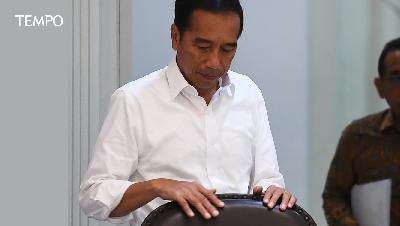
Jokowi passed a number of strategic policies at the end of his administration. Making the president-elect a hostage to fortune.

Illegal gold mines that collapsed in Solok Regency, West Sumatra, damage the Batanghari watershed. Authorities are suspected of protecting investors.
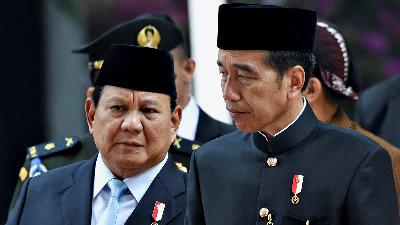
Before Jokowi’s term ends, the Presidential Palace is maneuvering to provide cover for Gibran. This includes erasing traces of the Fufufafa account as well as interfering in the formation of Prabowo’s cabinet.
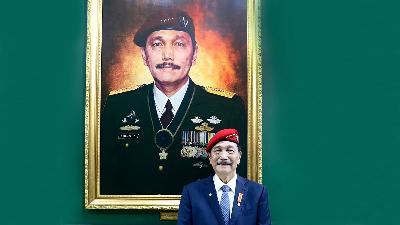
Luhut explains his close ties with Jokowi, and the plans of the president-elect Prabowo. This is his first interview with Tempo after the one on the Panama Papers eight years ago.
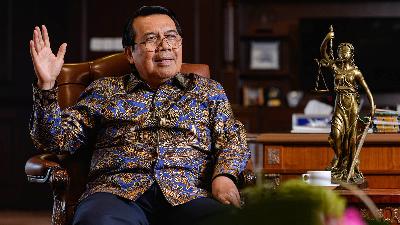
Supreme Court Chief Justice Muhammad Syarifuddin uses artificial intelligence to handle cases. Case brokers continue to be a threat.
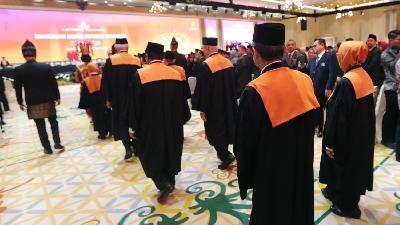
The race for the position of Chief Justice of the Supreme Court is heating up amid a flurry of allegations against certain candidates. There is suspicion of backing from business circles.

Indonesia and other countries continue to oppose the European Union’s Deforestation Regulation. The European Commission proposes a delay.

VIVA Group is facing a restructuring process under a debt payment suspension scheme and is threatened with bankruptcy. There are maneuvers to lobby creditors and reduce debt.
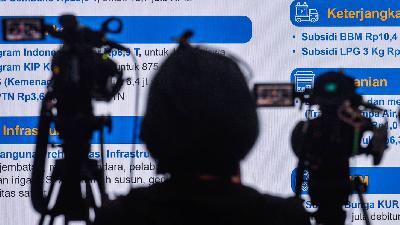
Media companies are experiencing upheaval due to the rapid changes in the business landscape. The industry is moving towards a new equilibrium.
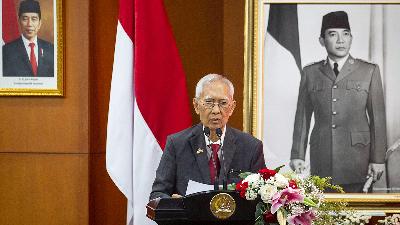
President Joko Widodo is suspected of supporting the restoration of Suharto’s name, with a possibility of being declared a national hero.
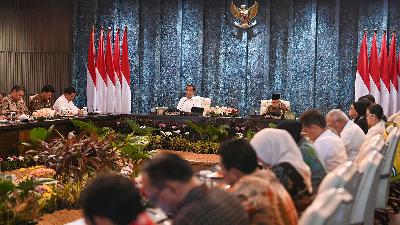
Jokowi is preparing for the incoming Prabowo-Gibran administration starting in late February 2024. He hopes that Prabowo can continue his programs.

Indonesia’s economy and financial markets are once again facing volatility stemming from China and the Middle East, leaving no respite for investors.

Power is never without crisis. Tumapel shows power as a story of unending antagonism.

With old faces still occupying more than half the seats, can DPR members be trusted to speak up and truly represent the people’s voice?
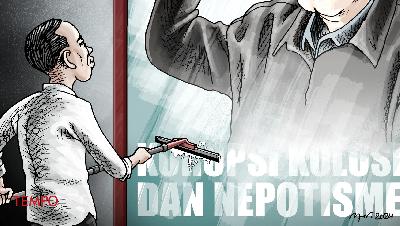
Cartoon: Yuyun Nurrachman

The police arrested a drug baron who was operating from inside a prison. It is a chronic problem that remains unsolved.

Using a variety of pretexts, the political parties replace elected legislative candidates. This is a betrayal of the people’s choice.

The kidnapping of pilot Phillip Mehrtens was ended through negotiation. This is a lesson for the Prabowo administration about how to resolve the Papua conflict.

The sea sand export policy benefits financial backers close to tycoons. Also, it is a gift for Singapore.
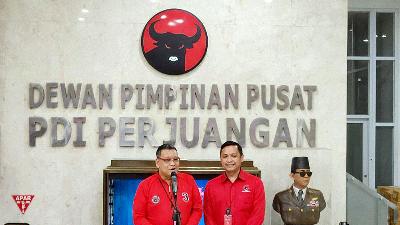
Political parties replace elected legislative members over alleged vote manipulation.
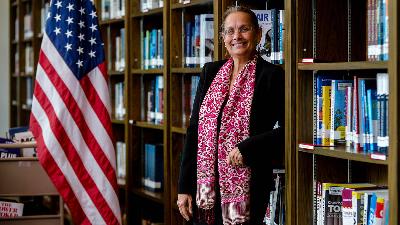
United States Ambassador Kamala Shirin Lakhdhir speaks about women, education, and Indonesia’s new administration.

The partnership between Riau regional company and Kingswood Capital Ltd resulted in criminal charges, with two top executives now facing allegations of embezzlement.
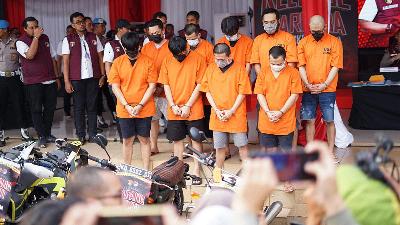
Hendra Sabarudin’s drug network distributed methamphetamine from Tarakan prison starting in 2017, allegedly aided by police and prison guards.
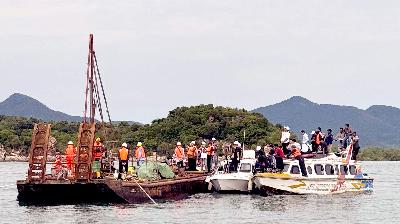
Customs has differing views from the Ministry of Maritime Affairs and Fisheries regarding sea sand export tariffs, aiming for regulations that facilitate ease.

Egianus Kogeya quietly freed Susi Air pilot Phillip Mark Mehrtens. His hope to trade the pilot for Papua’s independence failed.

The government plans to dredge 17.6 billion cubic meters of sea sand and sediment, altering the landscape and destroying marine life.

Two ministers of President Joko Widodo have paved the way for the exploitation and export of sea sand. Domestic and export interests are at odds.
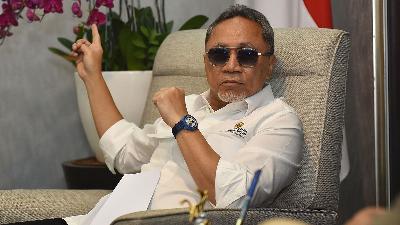
Trade Minister Zulkifli Hasan on the issues ranging from sea sand export policy to Prabowo Subianto’s bureaucratic management style.

The government designated a number of areas as zones for cleaning sediment and sea sand.
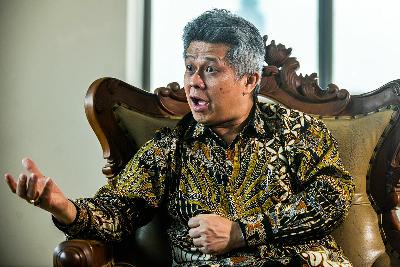
Chair of the Presidium of the Indonesian Bishops' Conference (KWI) Monsignor Antonius Subianto Bunjamin spoke about the preparations for Pope Francis’ visit.

Umar bin Abdul Aziz and Buya Hamka were among those whose leadership deserve to be made a model for Indonesian politicians.

The Federal Reserve's interest rates hike will still threaten the Indonesian economy. There are also political risks from the 2024 elections.
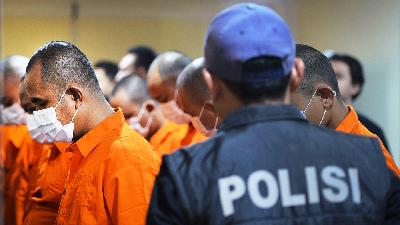
The police exposes Indonesian kidney trafficking network in Cambodia. The victims are enticed through social media.
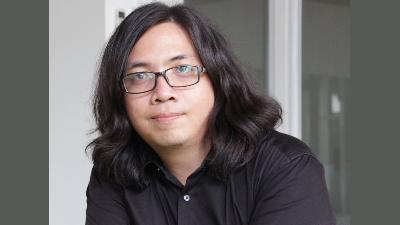
How much do Indonesians spend to play games? Rp30 trillion in just half year. The game industry has never been so appetizing.

Indonesian anti-colonial hero Untung Surapati is prominently present at the Rijksmuseum, the Netherlands’ national museum, in its first major exhibition highlighting the country’s dark slavery history.
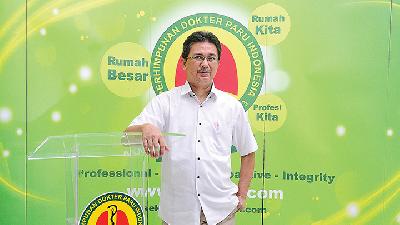
The number of health care workers dying from Covid-19 continues to climb. The Indonesian Medical Association has recorded that as of August 4, 74 doctors in total including three lung specialists who directly handled Covid-19 patients have died.
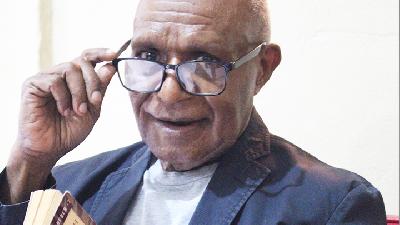
Chairman of the Synod of Indonesian Gospel Tabernacle Church (Kingmi) Church in Papua, Rev. Benny Giay regretted the conviction of seven Papuan political prisoners who were tried for treason.

The Indonesian Chamber of Commerce and Industry (Kadin) is pushing the government to implement the ‘new normal’ sooner and ease the restrictions so as to bring the economy back to life.
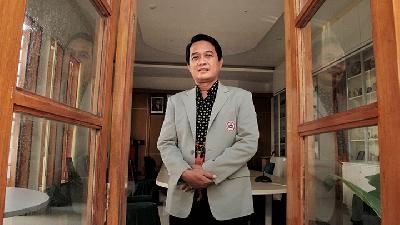
Following the March 22 announcement of the death of six doctors, the Indonesian Medical Association’s executive board (BP IDI) began posting on its social media pages obituaries for doctors who succumbed to the Covid-19, complete with a black and white portrait of the deceased doctors next to their names and academic titles.
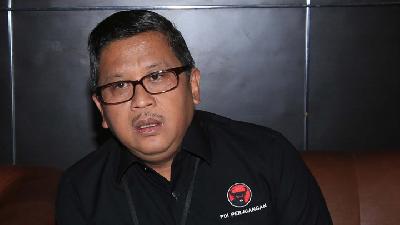
After General Elections Commission (KPU) commissioner, Wahyu Setiawan, was reportedly arrested, Indonesian Democratic Party of Struggle (PDI-P) Secretary-General, Hasto Kristiyanto, ‘disappeared’ almost one full day.
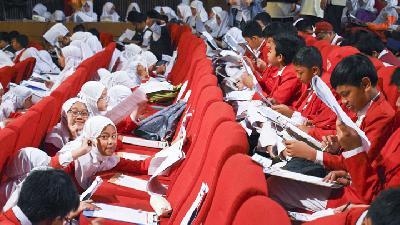
The Organization for Economic Cooperation and Development (OECD), based in Paris, has published survey results on the competencies of Indonesian schoolkids in science, reading and mathematics. Indonesia’s score is 396 for competence in science, 371 for reading, and 379 for mathematics.

THE Indonesian armed forces, particularly the army, found itself caught in a crossfire between supporters of Joko Widodo and Prabowo Subianto who are bitterly polarized in the recent presidential election.
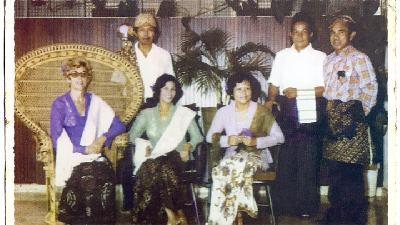
Curacao maintains traces of Indonesian history and culture, brought there through Dutch colonialism.

AT the end of January 2018, the massive Europalia Indonesia festival in Europe will come to an end. This time around, Indonesia follows Turkey as principal guest in the biennial arts festival in Brussels, Belgium. For four months starting October 2017, Indonesia has presented various forms of art, from dance, music, literature to fine arts, not only in Belgium but also in cities in Germany, the Netherlands and France. The event’s major highlights are two substantial Indonesian cultural exhibitions in Brussels and Liege. In Brussels, the exhibition is titled “Ancestors and Rituals,” and in Liege “Les Royaumes de la mer: Archipel” (Kingdoms of the Sea – Archipelagos). Dozens of Indonesia’s masterpiece sculptures are on exhibit in both cities. Curating and shipping these sculptures were a long process as they had to be collected from Jakarta, Bali, Sumatra, Ambon as well as other regions. Several dance performances and fine arts exhibitions are also presented in a number of cities in Belgium. Tempo’s Seno Joko Suyono reports on the festival.

Chinese cars are re-penetrating the Indonesian market. The Cikande factory has become their production base in Southeast Asia.

Many elderly Indonesians can easily sing along to Geef Mij Maar Nasi Goreng (I prefer fried rice), a tune that recalls a nostalgic life during Dutch colonial times. The song's composer, Wieteke van Dort, is an icon of the Indo (Dutch-Indonesian)community.

Sex tourism is quietly flourishing in many Indonesian cities, bolstered by the Internet, which enables widespread promotion overseas. In a world of anonymity, children are the victims.

2016 was a year which saw local films succeed in garnering more than one million viewers and a time that was rife with indie productions arising from the grassroots. in this edition, Tempo presents our selection of films released throughout 2016, our end-of-year alternative to other film awards. our sole aim: to celebrate the verve and passion of quality indonesian cinema today.

Alfred Riedl, 67, has proven himself again. The strategy of this Austrian trainer managed to take the Indonesian national football team to the finals of the 2016 AFF Suzuki Cup. This was certainly an achievement given that Riedl trained the 23 players in the team for only four months, following FIFA's suspension on the All-Indonesia Football Association (PSSI), last May.
The Garuda team transformed itself into an unbeatable team during the early competitions. At every game, from the qualification phase to the first leg and on until the peak, Boaz Solossa and his fellow players scored two goals. Indonesia's step was only stopped in Bangkok, after it lost 02 to Thailand, the defending champion, two weeks ago. "The national team did its best," said Riedl. It was the second time he trained the Indonesian team, on both times reaching the top. At the final of the 2010 AFF Cup, Indonesia lost to Malaysia when it was playing its best.

Property transactions by Indonesians in Singapores elite areas are conspicuously rising. Amid the tax amnesty programs aggressive campaign, Indonesians are choosing to bury their money in the neighboring country.

Taking a long flight from London, International Coffee Organization Executive Director Roberio Silva wanted to convey some important news: the world was waiting for Indonesian coffee. He explained that coffee trading for 2015-2016 at the London Commodities Exchange had just ended, noting that the world demand for coffee reached 151.3 million sacks (60 kilogram sacks). Meanwhile, supply came to only 148 million sacks.
Silva also believes that Indonesia has the highest potential to fill in the shortage, explaining that Indonesia was the fourth largest producer of coffee in the world, after Brazil, Vietnam and Colombia. At present, the productivity of Indonesian coffee plantations stands at 700 kilogram per hectare annually. This figure can be raised. He said there was plenty of land which could potentially be used for planting coffee.

INDONESIA is a country with the largest economy in Southeast Asia, enjoying an annual gross domestic product (GDP) growth rate of 5.1 percent this year, according to the World Bank. It has slowed down since last year, but the country continues to grow. To entrepreneur Umar Lessy, who is deputy secretary-general of the Indonesian Young Entrepreneurs Association (HIPMI), Indonesia needs more entrepreneurs to ensure a sustainable economic growth.
According to HIPMI, only 1.5 percent of Indonesia's total population run businesses. "Ideally, there should be at least 2 percent of entrepreneurs for a developing country like us. We are short by 1.7 million businesspeople," he said.

AGUS believes that luck has been on his side. One April morning in 1997, right before he left for his interview at Spandershoeve Restaurant in Hilversum, his Dutch permanent resident card came in the mail. "The first thing they asked me when I sat down at the interview was: Do you have a resident permit?"
It might have been luck that landed Agus-who at that time had no formal cooking experience-in the first Indonesian kitchen to be awarded a Michelin star, the most coveted attribute in the culinary world. Ultimately, though, it was just hard work, determination and a total passion for food that have made him the most visible chef of Indonesian food in the Netherlands.

Offshore companies and tax havens have normally been associated with the rich and famous from the industrialized world. But with the rapid pace of globalization, it was just a matter of time before the nouveaux riches of the developing economies followed suit. Not surprisingly, therefore, the so-called Panama Papers contain lists of people from all continents of the world. For us, it's the shocking number of Indonesians mentioned that leaves us agog with curiosity.
A number of public officialsamong the almost 900 Indonesians mentioned in the documents leaked from Panamanian law firm Mossack Fonsecacould be breaking the law. It is difficult to justify their conduct in employing the firm's services to set up companies in several tax havens. At the very least, this is an indication of attempted tax evasion.

Since it was created in 1817, the Bogor Botanical Garden has succeeded in conserving 60 percent of rare plant species, including endemic ones, 111 of which the International Union for the Conservation of Nature have classified as on the 'red list'. The Indonesian Institute of Sciences (LIPI) is currently conducting a conservation program in four national botanical gardens. They are the gardens in Bogor and Cibodas in West Java, Purwodadi in Central Java, and in Bali. Lately, LIPI has set out to create more than 30 botanical gardens in the regions, among them in North Sumatra, South Sulawesi, West Kalimantan, Riau, and Papua.
According to Sri Rahayu, botanical gardens in the regions were established as an effort to cultivate endemic plants in their original habitat. This is important because some plants are difficult to grow outside of their habitat.

Indonesia is a vast archipelago with bountiful resources. This is the reason why Dwi Susilaningsih has spent more than 20 years researching marine microbes that can potentially be converted into energy. She lamented, however, that Indonesians were slow to take advantage of such sources as the sun, wind or sea currents as renewable energy sources. As of today, only five percent of the total energy produced in Indonesia is renewable.
"And those renewable energy sources are small scale," said Dwi, head of the Infrastructure Research Center at the Biotech Division of the Indonesian Institute of Science (LIPI). Not surprisingly, she hopes the government will put more effort into producing energy from renewable resources, instead of from fossil fuels. This would be in line with the commitment made by more than 180 countries, including Indonesia, to reduce global emission after the UNFCCC-COP21 in Paris last year.

Indonesian martial arts or pencak silat recently caught the attention of the social and mainstream media following the appearance of some silat fighters in certain Hollywood films, like Star Wars: The Force Awakens, currently showing in local cinema halls. Iko Uwais, Yayan Ruhian and Cecep Arif Rahman are some of the silat fighters who have appeared in Indonesian as well as foreign films. In The Raid, directed by Gareth Evans, the three actors were equally impressive.
They are by no means the first Indonesians to be given the chance to play a role in a foreign film. Previously, Iko played a role in Man of Tai Chi and Beyond Skyline. In an interview with Tempo last month, Iko said he would always be an 'ambassador' of pencak silat in every international films he is involved in.

Indonesia is one of the world's biggest exporters of migrant workers. By November 2015, Indonesia has placed about 253,084 workers in a number of countries. This does not exclude those who leave quietly on their own. The consequent problems reflect the massive number of Indonesians working overseas.
Data from the Indonesian Migrant Workers Placement and Protection Agency (BNP2TKI) from January to the end of November indicate that 4,730 issues involving migrant workers have been reported. Most of the problems could be traced back to the migrants' places of origin, when they are first recruited or when they apply for overseas work. The problems range from incomplete or questionable documents to unclear contracts and related issues.

TO promote organic farming these past three years, Putro Santoso Kurniawan has been managing the 100-member Association of Indonesian Farmers' Cooperatives in Bogor, West Java. Through these cooperatives, farmers can sell their produce directly to consumers. "This is our way of ensuring that the prices of organic products remain accessible to the farmers," said 40-year-old Putro, a graduate of the Bogor Institute of Agriculture. He claims the limited production at the moment and the long supply chain have made organic products expensive to consumers. "This process benefits the distributors," said Putro, but discourages buyers. As a result, farmers become discouraged and in the end, many choose to go back to using chemical-based fertilizers.
Two weeks ago, Putro spoke with Tempo English by telephone on a number of ways and strategies of spreading the concept of organic farming and how to make it succeed. Excerpts:

It cannot be denied that some kind of 'agreement' exists between doctors and pharmaceutical companies in the sale and marketing of drugs. It's not unusual for a doctor 'tied' to a pharmaceutical company to prescribe unnecessary products to patients, such as antibiotics and vitamins. "In fact, sometimes it's enough to advise patients to rest and eat regularly in order to get better," said Zaenal Abidin, president of the Indonesian Medical Association (IDI).
When Tempo visited Abidin at the IDI headquarters in Central Jakarta three weeks ago, he admitted there were doctors who 'flirted' with pharmaceutical companies, even though the consequences can be quite harsh in some cases, such as the revocation of their medical licenses.

Indah Morgan's visit to Indonesia last August was a busy one. She not only attended the Indonesian Diaspora Congress in Jakarta and a related event in Yogyakarta organized by the Javanese diaspora, she also traveled to Bandung in West Java, to Semarang in Central Java, to Banyuwangi in East Java, and to Lampung in Sumatra.
Despite the destination-filled itinerary, Indah was not on vacation. This former global coordinator of Immigration and Citizenship Taskforce of the Indonesian Diaspora Network met with former migrant workers, activists and even government officials, such as the regent of Banyuwangi. "I discussed with him the upcoming ASEAN Economic Community," said Indah, 49, at one of the side events of the Indonesian Diaspora Congress. "Indonesia sends skilled workers to other countries not just as workers, but also as envoys of tourism, culinary expertise, education, and culture. My dream is that the government will adopt more people-to-people diplomacy for Indonesia," said Indah.

As the world's biggest seaweed producer, Indonesia lags behind other countries in processing seaweed products. "Our biggest competitor is China, yet they buy their raw materials from us," said Soerianto Kusnowirjono, chairman of the Indonesian Seaweed Industry Association (Astruli). In an effort to seek a solution to the problem, Astruli last March launched its roadmap for seaweed industry development.

According to a new book, Nazi ideology had made its presence felt well before the formation of state ideology Pancasila in Indonesia. Offices for the Nazi party were set up in 1931 in Jakarta (then called Batavia), Surabaya, Bandung, Medan, Padang, and Makassar. Together, the islands in the Dutch Indies (now Indonesia) contained the second-largest Nazi presence in Asia, second only to China.
This fascinating discovery was put forward in a two-volume set published in Germany last February, entitled Hitlers Griff nach Asien (Hitler's Grab for Asia), and authored by German writer Horst H. Geerken, 82. In addition, according to Geerken, Hitler also supported the struggle of the voluntary paramilitary force, Peta, a contraction of 'defenders of the homeland' in Indonesian, by providing military assistance and training.

The recent execution of convicted Australian drug smugglers Andrew Chan and Myuran Sukumaran along with six other inmates from Nigeria, Brazil and Indonesia has led to tensions-once again-between Jakarta and Canberra, which recalled its ambassador to Indonesia following the executions. Tempo English contributor Edward Stephens met with Professor Greg Barton from the Australia-Indonesia Center in Melbourne, Australia, last week to gain his insight on the up-and-down relations between the two countries. Barton has conducted research on Indonesian politics and society for over 20 years. He is also the international director for the Global Terrorism Research Center. Excerpts:

YOUTH and Sports Minister Imam Nahrawi was in Wollongong, Australia when the bad news hit him on April 10. The world football association FIFA, through its secretary-general Jerome Valcke, had sent Nahrawi a scorching letter. It asked the government not to interfere in the affairs of the All-Indonesia Football Association (PSSI).
FIFA sent the letter after an unending dispute about the participation of two football clubs which failed to pass the verification test of the Indonesian Professional Football Board (BOPI) to compete in the Qatar National Bank League 2015 (previously the Indonesian Super League). The clubs were Persebaya and Arema Cronus. According to FIFA, the government through BOPI forced the additional criteria so that the clubs could take part in the competition. FIFA said that was the authority of the PSSI, as the extended arm of that international association.

INSTABILITY and chaos following air strikes aimed at the Shia Houthi rebels in Yemen has led the Foreign Ministry to activate its evacuation of Indonesian citizens program. By the ministry's count, as of September last year there are more than 4,000 Indonesian citizens living in that war-torn part of the Middle East. Twenty-three among them were arrested by the Yemeni authorities, but released on March 30.

THERE are about 5.5 million Indonesians and people of Indonesian origin living across five continents. I have had the good fortune of meeting many of them. Our diaspora consists of honest entrepreneurs, successful professionals, respected academics, skilled workers and more. Almost always, they have one thing in common: they yearn to do more for their homeland.

Sacha Stevenson is one of the most reviled women on the social media scene in Indonesia, with thousands of hate-mail hits to counterbalance the hundreds of thousands 'thumbs-up' she gets a week. As host of the popular How To Act Indonesian on Youtube, she sometimes takes on certain sacred cows that hit a wrong nerve for some of her subscribers. Canadian-born Stevenson has travelled extensively around Indonesia, at one time on roller blades, inspiring her to write her experience in a piece called Bule on Blades. She is a graduate of the American Open University in Islamic studies. she speaks Indonesian and Arabic. Tempo English contributing editor Debra Yatim caught up with her after her appearance at the 2014 Ubud Writers and Readers Festival in Bali recently. Excerpts:
How did you start on your merry path and become so widely known in Indonesia?
I started off treating my YouTube as a Facebook page, uploading stuff for no rhyme or reason, like you would post something on Facebook. I started getting serious when I began putting up parody; I did a parody of a pop song which I called 'BB,' making fun of how everybody in Indonesia was using the BlackBerry. It became difficult for me to do it weekly because I was doing it from my kost (rented room) and had to wait till deep at night to do it. After a while, I came up with the idea to do very, very simple sketches about Indonesian daily life. They would only take me a couple of hours, and I could upload them once a week.
Did you do that like a diary, or what? Why?

IN the news last month were revelations that police and military had overseen the systematic exploitation of Indonesian migrant workers passing through Jakarta's Soekarno-Hatta Airport. The Corruption Eradication Commission (KPK) blew the scandal wide open when it made a sudden inspection at the airport's Terminal 4, which is under the jurisdiction of the National Agency for Placement and Protection of Indonesian Overseas Workers (BNP2TKI). Two policemen and a soldier were among those arrested.
Up to 1,000 migrant workers pass through the terminal each day, and a variety of methods have been used to take advantage of them. According to Tempo's investigation, they could be forced to exchange money, buy cell-phone credit or luggage carrier services or procure documentation or a ride home at exorbitant rates.

Avianti Armand, who heads the team of curators of the Indonesian Pavillion at the Venice Architectural Biennale, was happy. From the beginning, the team had planned Indonesian architecture to be presented in video form. To be exact, seven video presentations were featured at the Indonesia Pavilion, each lasting eight minutes. One was on Indonesian architecture in general, while the others focused on the materials of craft-making: wood, stone, brick, steel, concrete and bamboo.
Scores of buildings in the country's big cities were studied by the team of curators. They travelled from Jakarta to East Nusa Tenggara, visiting the Istiqlal Mosque in the capital city to traditional houses in Kampung Wae Rebo in Manggarai, Flores. The most effective way of putting them all together was through a video. "Even our proposal was in video form," said Avianti.

In an 11-minute video, a group of young men with their faces covered in balaclavas could be seen holding assault rifles. They stared nonchalantly into the camera. One of them was wearing a t-shirt with the words "Indonesian Army" written on the chest. The men were former Indonesian soldiers, some business people and students.
The men spoke in Indonesian, urging their fellow countrymen to join them and their jihad. "Let us fight on the path of Allah because it is our duty to do jihad on the path of Allah...especially in Sham (the Syrian region)...and because, God willing, it will be to this country that our families will do the holy migration." Another man exhorted the police and the armed forces to repent and abandon their country and its state ideology, Pancasila, calling it an idolatrous ideal.

From the late 1940s to the mid-1960s, Siauw Giok Tjhan was an active figure in promoting the integration of ethnic Chinese into Indonesian society. Siauw believed that the Chinese who had lived in Indonesia for generations deserved to be recognized as an ethnic group equal in status to the Javanese, Sundanese, Malays, Bataks, Ambonese and Papuans.
For Siauw, integration did not mean that Chinese Indonesians should have to give up their heritage and traditions. To promote this vision, on March 13, 1954 he established the Indonesian Citizenship Consultative Body (Baperki), which went on to establish many schools.
Baperki also established Indonesia's first private university, Baperki University, which later became Res Publica University. Under Siauw's leadership, Baperki formed ties with Sukarno's government, which was leftist-oriented. After the tragedy of the September 30 Movement, for which leftist elements were blamed, a mob burned down Res Publica campus in Grogol on October 15, 1965. March 23 this year marks 100 years of Siauw's birth. In this issue, Tempo features Siauw's life story, an eyewitness testimony on the torching of Res Publica University.

Some of the world's most spectacular films have Indonesian animators behind the scenes. One of them returned to Indonesia to open his own company.

Yus Badudu came to prominence when he began hosting the program Developing the Indonesian Language broadcast by the state-run TVRI at the end of the 1970s. He wrote dozens of books, articles and academic texts about issues pertaining to the Indonesian language. He is one of a very few Indonesian language experts who were widely known. Yus once said that the teaching of the Indonesian language and of literature was a big failure in schools, since students had never become skilled, both in using it orally and in writing it.
Suharto's New Order regime was often offended by Badudu's criticism of officials who could not speak Indonesian properly. His expertise and popularity regarding Indonesian went even beyond that of the Language Center institution. In the past, it was not unusual to hear language teachers say: "According to Yus Badudu"
Today, at the age of 87, Yus lives a quiet life in Bandung. After suffering two strokes, this man whom language expert Anton M. Moeliono called "the teacher of language teachers" does not say much. He has been overlooked and underappreciated by today's public. Tempo met with Yus.

From education to better investment climate, Indonesian diaspora's contribution for the country's economy is much needed.

Born of a family selling Bali's famous roast suckling pig, Henry has always loved the flavorful cuisine of Indonesia since he was young, which inspired him to do something about preserving traditional recipes. Wherever he worked as executive chef in starred hotels, Henry, 45, always tried to serve an assortment of Indonesian fare and share his knowledge to a younger generation.

The Indonesian Pavilion was less dominated by multimedia than those of other countries. It was also more concerned with identity.

The Indonesian Pavilion at the Art Stage Singapore 2013 celebrated modernism, a movement contemporary art has already abandoned.

Rattan boards, an innovation of Indonesian craftspeople, have piqued the interest of the international market. At the International Mebel Messe (IMM) exhibition in Cologne, Germany, requests for rattan boards reached US$2 million, exceeding the value of requests at exhibitions outside Indonesia, which had reached US$1.2 million. "Rattan boards are a new innovation. It turns out that there is a positive response and an ample number of requests," said Dedi Mulyadi, Industry Ministry Director General for Development of Industrial Zones, in his office last Monday.

Indonesian musicians are cashing in on songs they compose, as piracy threatens to undo all their work.

As people move to cities, and buildings become standardized, a string of movements have emerged to counter this trend, to preserve Indonesian architecture. They seem to have rediscovered their missing 'DNA link,' ensuring that the diversity of cultures and traditions remain their identities.

The Indonesian Army will buy 100 battle tanks worth Rp2.5 trillion. No brokers will be involved in the transaction.

Eleven Indonesian artists are exhibiting at Louis Vuitton Culturel Espace, Paris. A gallery with a good reputation among contemporary art circles in France.

As many as 41 works of art from 18 Indonesian contemporary artists will be on display first in Jakarta and then at the Saatchi Gallery, one of London’s foremost art galleries. It is a golden opportunity for Indonesian art to enter the international arena.

Hundreds of young Indonesians are using their talents to develop both computer and cellphone game programs. Some have managed to reap billions by providing downloadable content for iPhone or iPad users and from displaying their applications on international game websites. Gameloft, the world’s second-largest game studio, will recruit hundreds of people for their new office in Yogyakarta.

Higher rice prices did not mean higher income for Indonesian farmers as their buying power remained low.

An accumulation of concern over and hope for Indonesian soccer achievements emerged during the National Soccer Congress in Malang on March 30-31. After a series of matches that ended in embarrassment to our national team, stakeholders deemed it necessary to conduct immediate reordering, including a total reform of the Indonesian Football Association. The fact is that Indonesia has not yet found the right formula to build a national team capable of bringing the country world fame.

Persipura players form the backbone of the Indonesian national soccer team. Even the Mandala stadium in Jayapura is now being renovated to host the 2010 Asia Cup.

Indonesians on Sebatik Island in East Kalimantan are used to Malaysian ringgit as a medium of exchange.

PARLINDOENGAN Loebis was the leader of Perhimpoenan Indonesia, an association of Indonesian students studying in the Netherlands, when he was arrested by the Gestapo and sent to Buchenwald to languish in the infamous German concentration camp for four years until his release by the Allies in 1945.
In an autobiography titled Orang Indonesia di Kamp Konsentrasi Nazi, Parlindoengan Loebis (1910-1994) wrote of the horrifying experience he went through. I should be prepared to be incarcerated for years. That is, if Im not killed outright. To survive in the camp, I must be hard-hearted and unfeeling like a stone. Parlindoengan refused to cry.
Tempo examines the book and interviews people close to Parlindoengan and those with fond memories of the man forgotten by his own generation.

Indonesians in droves are buying apartments in Singapore.

LAST month, the Philippine government began identification of Indonesian migrants in Mindanao. They were offered a choice of repatriation to Indonesia, legalization or naturalization. Legalization allows the immigrants to stay in the Philippines and retain their Indonesian citizenship while naturalization provides the migrants with full Filipino citizenship. Most of the migrants came from the islands of Sangihe and Talaud in northern Sulawesi. The forefathers of these Indonesians, who have since taken Philippine citizenship, arrived in the southern Philippines in the 15th century. Locally called the Sangil, they considered themselves natives of Mindanao Island, although they spoke a language originating in Sangihe. Tempo correspondent Verrianto Madjowa traveled to Mindanao last September to observe the lives of the Indonesian migrants and filed this report.

The residents of Badau and Lubok Antu feel like they are part of a single community, despite being separated by the Indonesian-Malaysian border.

The nations speaking Austronesian languages came from the Indonesian archipelago instead of Taiwan. This new theory remains open to debate.

Greg Barton's book touches only the tip of the iceberg of contemporary Indonesian radicalism.

It's now clear that Indonesian Airlines, currently beset by serious problems, is owned by Santayana Kiemas, brother-in-law of President Megawati.

Corrupt practices continue to bedevil the Indonesian justice system _ five years after reformasi.

Labor regulations in Malaysia are making it more difficult for Indonesians to find work. What's the reason?

If the Philippines-based Abu Sayyaf group is behind the kidnapping of Indonesian nationals, it's difficult to guess their motives.

One Japanese cosmetic company holds 24 patents over Indonesian indigenous plants. Must we now pay taxes on the spices in our own backyards?

Indonesian police intelligence, long restricted to dealing with ordinary crimes, finds itself powerless upon being entrusted with internal security duties.

The tactic of police intelligence officers pretending to be a journalist is exposed. This is a deceitful disguise that could erode public trust.
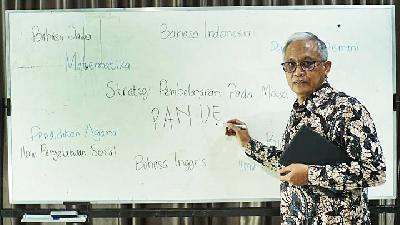
Concern for learning loss is the primary reason for not fully relying on online learning activities. Ensuring the public’s disciplined adherence to health protocols is also a challenge in and of itself.
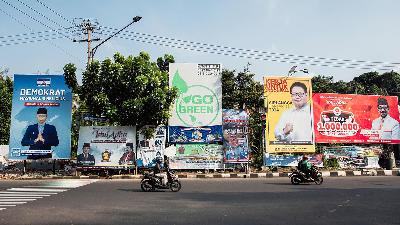
Presidential hopefuls are already campaigning amid the COVID-19 pandemic. Some have the Palace’s blessing.

EIGHT ulemas from various parts of the archipelago spread Islam to different corners of what is today known as Indonesia. Faced with many challenges, such as stormy seas and isolation in their new homes, they worked to preach the religion, embracing communities that did not share their faith with their knowledge and wisdom. Like the wali (saints) before them, these ulemas promoted a peaceful and compassionate Islam.

During the Gue 2 Concert held in Senayan, Central Jakarta, two weeks ago, many people dressed in black formed a line to welcome Basuki Tjahaja Purnama (Ahok) and Djarot Saiful Hidayat to the stage. That day, the campaign was livened by many celebrities hailing from the Indonesian capital.
This group in black was the Brigade Beringin, which was formed by the Jakarta branch of the Golkar Party. Together with the Indonesian Democratic Party of Struggle (PDI-P), the Hanura Party, and the National Democrat (NasDem) Party, Golkar is supporting the candidacy of Ahok and Djarot. "Their presence in Senayan was to test out security," said Yorrys Raweyai, Coordinating Chairman for Political, Legal and Security Affairs for Golkar, last week.

Syaiful Aulia Garibaldi creates art with tissue from living organisms such as mushrooms, worms and bacteria. Last year he explored the use of lichens.

Suciwati's initiative is long overdue. The widow of human rights activist Munir Said Thalib requested the Central Information Commission (KIP) to disclose the fact-finding team's results. Suciwati's quest may finally be the first step to unveiling and punishing those ultimately responsible for the heinous crime against her husband.
Munir died on September 7, 2004, aboard a flight from Jakarta to Amsterdam. The autopsy results confirmed that arsenic poisoning had caused the death. After 12 years, the real masterminds have never been identified and the case is far from full resolution. Several officials of the National Intelligence Agency (BIN) suspected to have been involved in the crime are still on the loose. Only Pollycarpus Budihari Priyanto was sentenced to 20 years in prison, along with Indra Setiawan, former CEO of flag carrier Garuda Indonesia. The latter was found guilty of falsifying Pollycarpus' assignment letter.

Gazing at the dozens of students gathered, Gus Reza told the story of a blind Jewish woman who reviled the Prophet Muhammad on a daily basis. Gus Reza, whose full name is Kiai Haji Reza Ahmad Zahid, was sitting cross-legged on the mosque's porch area at the Al-Mahrusiyah Islamic boarding school in Kediri, East Java, on the second day of the Ramadan fasting month. Whenever someone approached, said Reza continuing the story, the blind beggar woman who lived in a corner of the market in Medina spread hatred so that people would not believe in Muhammad's message. "Muhammad is a liar, a magician," said the woman, as told by Reza.
The Prophet was aware of all this. Yet, every morning he brought the elderly Jewish woman food and fed her by hand. He did not say a word when he did this. One day, Muhammad went away and the elderly woman felt the loss of the person who had always given her food. It was only after missing him for several days that the woman found out from Abu Bakar Ash-Shiddiq, a friend of the Prophet, that the despised Muhammad had been the one feeding her all along. "This teaches us that Muhammad respected his haters, as well as people of different faiths," said Reza.

Gazing at the dozens of students gathered, Gus Reza told the story of a blind Jewish woman who reviled the Prophet Muhammad on a daily basis. Gus Reza, whose full name is Kiai Haji Reza Ahmad Zahid, was sitting cross-legged on the mosque's porch area at the Al-Mahrusiyah Islamic boarding school in Kediri, East Java, on the second day of the Ramadan fasting month. Whenever someone approached, said Reza continuing the story, the blind beggar woman who lived in a corner of the market in Medina spread hatred so that people would not believe in Muhammad's message. "Muhammad is a liar, a magician," said the woman, as told by Reza.
The Prophet was aware of all this. Yet, every morning he brought the elderly Jewish woman food and fed her by hand. He did not say a word when he did this. One day, Muhammad went away and the elderly woman felt the loss of the person who had always given her food. It was only after missing him for several days that the woman found out from Abu Bakar Ash-Shiddiq, a friend of the Prophet, that the despised Muhammad had been the one feeding her all along. "This teaches us that Muhammad respected his haters, as well as people of different faiths," said Reza.

Once again, members of the House of Representatives (DPR) have shown their cunning in the way they work. They have been successful, but not in their work to enact laws. Instead, they have managed to secure funding to construct new buildings for themselves. The state budget, which it was feared might go beyond its deadline, was suddenly passed into law. One day before the recess, the DPR approved the budget. For this 'smart' move, the DPR awarded itself a funding of Rp564 billion.
There are signs that the budget for the construction of DPR buildings was the result of a bargain with the executive branch. Initially, the DPR proposed Rp740 billion. No one knew which building was to be completed first. Shockingly, the DPR dreamed of carrying out seven construction projects with a total value of Rp2.7 trillion. But subsequently this was toned down to three projects at a cost of Rp2.08 trillion. These were to be paid for out of the state budget in phases within three years: fiscal years 2016, 2017 and 2018. President Joko Widodo was inclined to reject this. He even refused to sign the comemorative plaque for the megaproject when he visited the DPR on August 16.

The December 9 International Anti-Corruption Day protests proceeded peacefully. But many decided to stay away.

Indonesia's export value is plummeting. It is doubtful that the stimulus package will positively affect the local market.

President Yudhoyono has asked people to be careful what they say, claiming Amien Rais had slandered him.

Eight pairs of candidates for gubernatorial posts signed a declaration for peaceful regional heads elections (Pilkada) last Thursday. The ceremony took place before the Baiturrahman Grand Mosque, Banda Aceh.

Matjuwi Burarrwanga and Mansjur Muhayang were separated by circumstances for decades until they were brought back together in a tearful reunion.

The busway system in Bogota is successful because of its integration with good city planning. Here is a report of TEMPO's visit.
Independent journalism needs public support. By subscribing to Tempo, you will contribute to our ongoing efforts to produce accurate, in-depth and reliable information. We believe that you and everyone else can make all the right decisions if you receive correct and complete information. For this reason, since its establishment on March 6, 1971, Tempo has been and will always be committed to hard-hitting investigative journalism. For the public and the Republic.